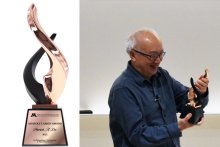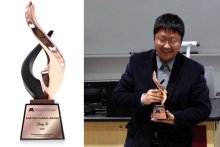2022 Larkin Award
The Anatoly Larkin Award in Theoretical Physics
Inaugural Award Recipients
The William I. Fine Theoretical Physics Institute (FTPI) at the University of Minnesota is proud to announce the recipients of the inaugural Larkin Award in Theoretical Physics
2022 Larkin Senior Researcher Award
Professor Patrick A. Lee
Massachusetts Institute of Technology (MIT) & California Institute of Technology (Caltech)
Professor Lee is being awarded the Larkin Senior Researcher Award for pioneering and wide reaching research in strongly correlated systems, in particular theories of the quantum transport phenomena in the mesoscopic and superconducting systems, and for his standing in the Physics community.
2022 Larkin Junior Researcher Award
Professor Liang Fu
Massachusetts Institute of Technology (MIT)
Professor Fu is being awarded the Larkin Junior Researcher Award for seminal works on 3D topological insulators and odd parity topological superconductors, crystalline topological insulators, Majorana zero modes, and for being an intellectual leader of his generation.
2022 Recipients
Senior Researcher: Patrick A. Lee
Massachusetts Institute of Technology
& California Institute of Technology

Junior Researcher: Liang Fu
Massachusetts Institute of Technology

Did you miss their lectures? Watch recordings of their Colloquium talks below and check out our YouTube channel for more recordings, including Seminar talks by Profs. Lee and Fu on their more specialized areas of research.
4/30/23: 2022 Anatoly Larkin Senior Award
Professor Patrick A. Lee from the Massachusetts Institute of Technology (MIT) and the California Institute of Technology (Caltech) was awarded the Senior Award for pioneering and wide reaching research in strongly correlated systems, in particular theories of the quantum transport phenomena in the mesoscopic and superconducting systems, and for his standing in the Physics community.
The title of his talk is, "An Overview of Quantum Spin Liquid: Standing on the Shoulder of a Giant Named Anatoly."
Abstract: I shall review the current status of quantum spin liquid, particularly the gapless variety which is described by emergent gauge fields and fermionic particles called spinons. The theory has benefited greatly by the insight of Anatoly Larkin on the role of gauge field fluctuations, leading to the famous Ioffe-Larkin rule. I shall review the status of several promising experimental candidates and describe some proposals to experimentally access the spinons as well as the gauge field.
4/23/23: 2022 Anatoly Larkin Junior Award
Professor Liang Fu from the Massachusetts Institute of Technology (MIT) was awarded the Junior Award for seminal works on 3D topological insulators and odd parity topological superconductors, crystalline topological insulators, Majorana zero modes, and for being an intellectual leader of his generation.
The title of his talk is, “Diodic Quantum Materials.”
Abstract: The p-n junction is the key building block of modern microelectronics that underlies diodes and transistors. In recent years, it has been found that certain quantum materials can have a direction dependent electrical resistance and thus exhibit an intrinsic diode effect without any junction. In this talk, I will first describe diodic superconductors that exhibit zero (nonzero) resistance in the forward (backward) direction. Such superconducting diode effect generally appears when Cooper pairs in the ground state have finite center-of-mass momentum, as in the Larkin-Ovchinnikov-Fulde-Ferrell superconductor. Next, I will describe noncentrosymmetric conductors that exhibit a nonreciprocal Hall effect at zero magnetic field, with the transverse current quadratic in the applied voltage. This intrinsic nonreciprocity is a fundamental material property that originates from the quantum geometry of itinerant electron states in crystals. Potential applications of diodic quantum materials in high-frequency (THz) and low-power electronics will be discussed.